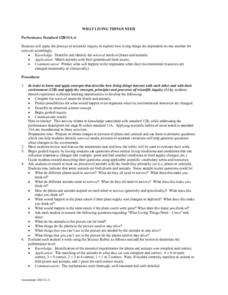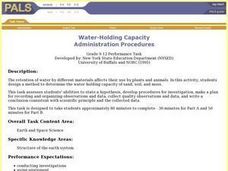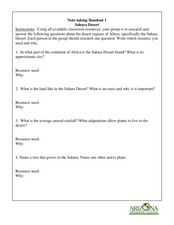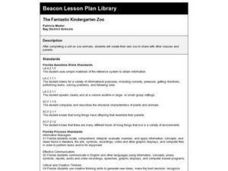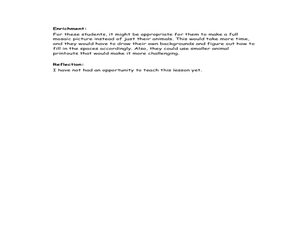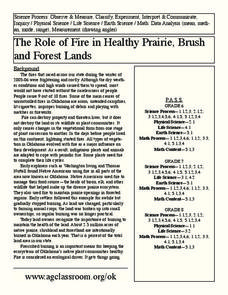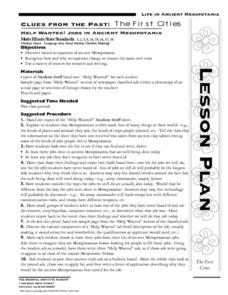Curated OER
What Living Things Need
Students apply the process of scientific inquiry to explore how living things are dependent on one another for survival. They match animals with their generalized food source. Students predict what happens to the organisms when their...
Curated OER
"Julie of the Wolves"
Fifth graders research life in Alaska and compare life there to their lives in this lesson. They read "Julie of the Wolves." They research through the novel and other reference books facts about the Alaskan climate and geography. They...
Curated OER
Pio, Pio, Que Frio
Learners investigate the characteristics of living things. They determine that different organisms have different needs and describe and compare them. They draw and verbally respond about their favorite animal.
Curated OER
VERTEBRATES
Seventh graders describe the main characteristics of warm-blooded vertebrate animals. They compare and contrast the two different groups of warm-blooded vertebrate animals by looking at external, reproductive, and growth characteristics.
Curated OER
How Far Away is a Tropial Rainforest?
Students explore how far a rainforest is from their home. In this rainforest lesson students examine how far they live away from the rainforest. Students use the length of their school day to compare how long it will take to travel to...
Curated OER
Colors of Wildlife
Students observe wildlife animals. In this wildlife lesson, students cut out three different animals from a wildlife magazine. Then they compare the animals, verbally stating their similarities and differences.
Curated OER
Water-Holding Capacity
Young scholars design and conduct an experiment to compare the water-holding capacity of sand, soil, and moss. They measure the change in weight for each material after adding the same amount of water to each material.
Curated OER
Note-Taking Handout 1: Sahara Desert
In this research skills activity, students collect information about the desert regions, savanna regions, and rainforest regions of Africa and then respond to 7 questions about each of the regions. Students then compare the regions using...
Curated OER
The Fantastic Kindergarten Zoo
First graders create their own zoo to share with other classes and parents. Groups create displays for the animals. Have each group brainstorm how they create a display for their animal.
Curated OER
Art Lesson Synthesis
Students observe animals and complete an art project. In this interdisciplinary lesson, students define the word mosaic, create animal mosaics, and share their creations with the class. As students explain their art to the class they...
Curated OER
Properties of Rocks
Students compare the properties of rocks. They identify objects made of rocky materials such as walls, sidewalks, etc. Students describe and group rocks based on their characteristics.
Curated OER
Moving and Growing
Young scholars learn to understand the role of both skeletons and exoskeletons. In this lesson plan on exoskeletons, students locate and label bones on diagram of a human skeleton, and observe and discuss bones of chicken and fish. Young...
Curated OER
The Role of Fire in Healthy Prairie, Brush and Forest Lands
Middle schoolers create a Venn diagram to compare and contrast wildfires and prescribed fires. In this earth science instructional activity, students conduct a series of experiment to explore fire characteristics. They describe favorable...
Curated OER
Food Web Follies
Seventh graders cut and paste animal pictures to create a food web and trace the path of energy. They write a paragraph explaining the importance of photosynthesis in all food webs.
Curated OER
Is there a Doctor in the Treehouse?
Students investigate the afflictions of trees and compare the health of a human to that tree. For this tree lesson students complete an activity and create and present a report.
Curated OER
The Wonderful Pigs of Jillian Jiggs
First graders compare fictional and real pigs. In this pig comparison lesson plan, 1st graders read a fiction text then a non-fiction text on pigs. Students complete a K-W-L chart and fill out a Venn Diagram.
Curated OER
Help Wanted! Jobs in Ancient Mesopotamia
Students explore life in early Mesopotamia through a list of jobs that people taken from an ancient clay tablet found in Mesopotamia. The list is compare to jobs still performed in today's society.
Curated OER
Illnois River and Lake Mussel Habitat Diorama Activity
Students identify the environmental elements of river and lake mussels. They compare the elements to the time before settlement and during industrialization. They also participate in a field trip to a mussel exhibit.
Curated OER
Tree Lesson
Students compare and contrast characteristics of conifer and hardwood trees. After collecting samples of branches around the school, they classify the branch as hardwood or conifer. Groups of students identify given twigs. They go...
Curated OER
Protists
In this protists activity, students compare and contrast the different types of funguslike protists: slime molds, water molds, and downy mildews. This activity has 1 short answer and 7 fill in the blank questions.
Curated OER
Diversity Ecosystems
Young scholars work in teams to characterize their biomes and compare them to the biomes of the rest of the class. In this biomes lesson plan, students complete a bean activity, relate it to the diversity in biomes, and then research and...
Curated OER
The Three Worm Phyla
Ninth graders examine the three worm phyla. In this classification lesson, 9th graders observe, compare and contrast the planarian, tapeworm, and fluke.
Pennsylvania Department of Education
Animal Classes and Their Ecosystems
Students explore animal characteristics by participating in an environment identification activity. In this animal habitat instructional activity, students discuss a range of different wild life and the ecosystems that they are a part...
Curated OER
Winter Season
Young scholars recognize the relationship between Earth's tilt and the Winter season. In this Winter lesson, students work in pairs to complete make frost and design snow goggles. Young scholars experiment a hand lens to study the frost...


